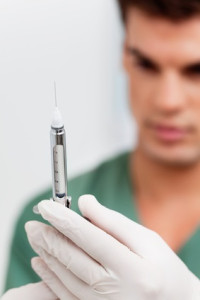There is a lot of anxiety surrounding the dental injection process. Whether it be from the  expectation of pain from the needle or the anxiety around being numb for an extended period of time, there are a lot of things that can cause distress prior to receiving an injection. So here are some frequently asked questions about what to expect from a dental injection as well as what you should expect to experience afterwards.
expectation of pain from the needle or the anxiety around being numb for an extended period of time, there are a lot of things that can cause distress prior to receiving an injection. So here are some frequently asked questions about what to expect from a dental injection as well as what you should expect to experience afterwards.
-
What are you injection me with?
The days of novacaine are long gone, now most dentists will use anesthetics such as lidocaine, mepivicaine or prilocaine. These anesthetics are available with or without a small amount of epinephrine. -
Why do you need to use Epinephrine? Epinephrine is used in local anesthetics to aid in increasing the duration and depth of anesthesia attainable.
-
Can I have an allergic reaction?
An allergic reaction to modern local anesthetics is very uncommon. In the past some had allergic reactions to some of the components, such as esters, in novacaine. However, the formulations that are marketed in the United States are made with amides as opposed to esters,and are less likely to cause allergic reactions. Some patients may be more sensitive to epinephrine in the anesthetic which can cause some feelings of increased heart rate and a slight tremor to the hands. If this happens let your doctor know. -
How long will I be numb for?
Most patients will be numb for about 1-2 hours after the procedure has been completed, with the average procedure length being about 45 minutes. That being each individual is different and recovery time from anesthesia can be different for each individual. -
What should I tell my Doctor before treatment with local anesthetics?
Let your doctor know any medications you may be taking as any adverse reactions you may have had with anesthesia in the past. This will help your health care provider choose the appropriate anesthetic for your particular needs.
